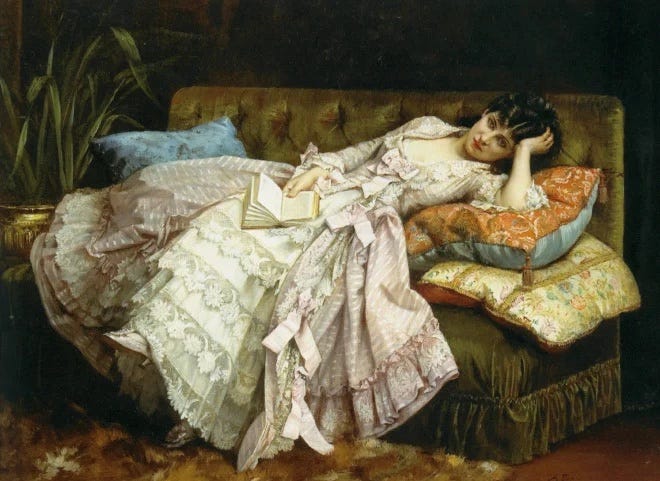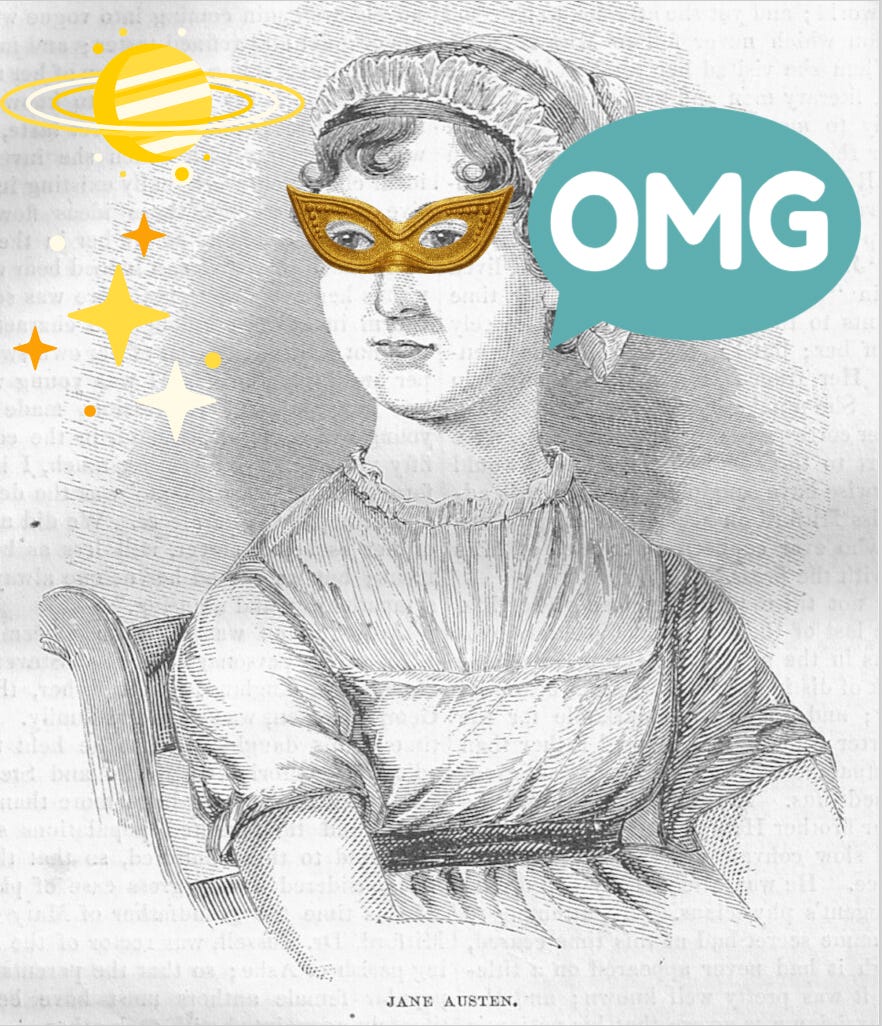Dear Modern Austen: Have I wasted my school year by being a neglectful friend?
Modern Austen advises Anguished on how to make more time for friendship.
Dear Modern Austen,
I’m a high school junior experiencing a great deal of anguish. During the school year, I’ve been devoting the majority of my free time to school work, meaning that I’ve been spending my lunches & other breaks in the day inside a classroom. Now that I’m in the last semester of the school year, I’m like, “how do I now hang out with my friends?” Most of my friends are engaged in extracurricular activities and barely free after school, and I barely go out either. Even if we were together, I’m not sure what we would talk about. One of my friends is also a senior, so it seems like I’ve been wasting what free time I have not spending time with them in their last year.
I do belong to a few clubs at school like crochet club, and while talking to my friend who is a senior about it, they shared that their mom had taught them to crochet, and we both realized that we could have been hanging out in crochet club. “I wish you had told me earlier; we could’ve spent more time together.” I sent them the details about the club, but it’s a shame that I didn’t know they can crochet sooner.
This is just one example of how absorbed and inside my own head I’ve been to not realize the chances I had to hang out with my friends. I’ve rightly devoted myself to my school work but feel like I’ve been a neglectful friend.
Modern Austen, have I wasted my school year by being a neglectful friend?
Sincerely,
Anguished
If there’s a personal matter you’d like Modern Austen’s advice on, you can send your letters to modernaustenblog@gmail.com. Please indicate whether you’re comfortable with your letter being published, & do use a clever pseudonym.
Dear Anguished,
I spent three years of high school largely inside my own head, afraid to recommend myself to anyone & apply myself to anything. Unlike you, I couldn’t even devote myself to school work. It was like I didn’t care to be accomplished, which is, perhaps, very un-heroinelike of me. I desperately wanted to leave high school & go to university in New York City, but still had not the will to be a person in the world. I can only attribute the feeling to years of schooling & not quite fitting in beating me down. I had tried different ways of being & behaving in an effort to find myself, but I always felt rejected, like something about my person wasn’t good enough. By my first year of high school, I had no idea how or who to be: Who should I be friends with, & how do I maintain these friendships? What changed for me senior year was mainly a feeling of optimism because I would be leaving soon. I started spending time in the school library & made friends with the librarian through book recommendations. I participated in activities I enjoyed & found myself allowing people to like me (& I liked them in return). I had a clearer sense of how I did & didn’t want to fit in, of what education I would allow to shape my mind going forward.
It might seem sad that it wasn’t until my last year of high school that I started to know & like my own mind enough to share it openly. To you, dear Anguished, it probably sounds like I wasted my high school years being miserable. But how can it be sad if this new self-awareness came at the right time for me? I’m probably not remembering this shift in my character as vividly as I should; I’m sure each year of high school brought gradual changes that were noticeable if not obvious, but the first real turning point in my heroine’s journey was my senior year. My head & heart were in want of use & company, & I realized that both would continue to weaken without proper education. The education I’m referring to is not the school work you’ve devoted so much of your time to, though that can be of use if it’s truly doing the work of educating & not indoctrinating. Rather, it’s an education in social responsibility & obligation.
The most trying part of youth is learning how society works. Most of us come to understand the world & our own role in it through home, school, & friends. For Austen’s heroines, home & school were one, as women of their class needed only enough education to perform their social role & secure a good marriage. But they would venture beyond their domestic borders to form friendships with other women in their communities, provided there was equality of mind, spirit, & station. Elizabeth Bennet & Charlotte Lucas in Pride & Prejudice had such a friendship. But it’s through this friendship that our heroine, Lizzie, gets the rude awakening that what is a sensible choice for her (to refuse Mr. Collins’s marriage proposal) is not what is sensible for Charlotte (she accepts that she’s Mr. Collins’s second choice). Until the opportunity for both these women to secure a “comfortable” future (in the ridiculous & pompous form of Mr. Collins) arises, Lizzie assumes Charlotte’s opinion of marriage is the same as her own, even though the future Mrs. Collins tells us that “happiness in marriage is entirely a matter of chance” (vol. I, ch. vi). Yes, Charlotte would be the first to say that she’s certainly not a romantic.
To become heroines, Lizzie & Austen’s other female protagonists must go through the process of unmaking their long-held beliefs about the world & themselves. Emma makes several social faux pas before learning the importance of showing genuine kindness to people in unfortunate situations & allowing people to choose their own happiness. Catherine Moreland realizes the education she’s received from gothic & romance novels may have steered her wrong. Lizzie, of course, must accept that her reason can be clouded by a handsome man in a red coat who also likes to shit-talk Darcy. This social education can prove painful for heroines, as Lizzie finds that “the more I see of the world, the more I am dissatisfied with it” (vol. II, ch. i). But this education is necessary, my dear Anguished, & at school you have the benefit of receiving these two types of education in parallel: What you learn in the classroom & what you learn from friends outside the classroom that unmakes that knowledge. New knowledge can only be created when what you already know is undone. This is how you grow as a heroine.
The problem with school is that it gives preference to scholastic education. One of life’s many cruelties is that you don’t realize how much more you learn outside the classroom than you do within it until many years have passed. But it sounds like you already know that by devoting all your time to school work you’re lacking the social connection you crave, even forgetting how to “hang out” with your friends. We do ourselves a disservice by not considering friendship a talent that wants nurturing, a truth Elizabeth Bennet must explain to Mr. Darcy:
“I certainly have not the talent some people possess,” said Darcy, “of conversing easily with those I have never seen before. I cannot catch their tone of conversation, or appear interested in their concerns, as I often see done.”
“My fingers,” said Elizabeth, “do not move over this instrument in the masterly manner which I see so many woman do. They have not the same force or rapidity, & do not produce the same expression. But then I have always supposed it to be my own fault—because I would not take the trouble of practicing. It is not that I do not believe my fingers as capable as any other woman’s of superior execution.”
— Volume II, Chapter viii
Now that I look back on my time in high school, I believe this must have been the turning point I had at the start of my senior year: that I would be resigning myself to misery if, like Darcy, I continued to think that I lacked what’s required to make friends. I didn’t have the practice, this is true, but the talent was there to be worked. And at four-and-thirty it’s still being worked, for being a friend requires constant practice. Even now that my school years are behind me, I still struggle to prioritize my obligations as a friend over work commitments, but I find it helpful to step back & acknowledge their difference: Friendship is an obligation that is meant to be long-lasting; school & work are time-bound commitments.
I wouldn’t be so quick to call you a “neglectful friend,” Anguished. Have you spent more time on your studies this year than visiting with friends? Yes, probably, but it sounds like many of your friends have made the same choice. As long as you make time to practice this talent, you’ll be able to get out of this state where you feel that even if you were with your friends “I’m no sure what we would talk about.” Remember that friends are part of your education, & you need to open yourself to what they can teach you. You discovered late in the year that your friend who is a senior knows how to crochet, a skill you joined a club to learn. It’s not “too late”—ask your friend to join the club for the remainder of the year, but don’t think that has to be all. You two can start your own crochet club outside of school, which, I must say, sounds very Modern Austen-esque! Women in Austen novels are always doing needlework while sitting together in a room. Your friendship does not have to be confined to school, so start developing this relationship outside of school hours, especially now that summer is coming.
Another thing I’ll say: Letters are a great way to remain close with friends you can’t be with. Writing a letter is not the same as texting, for they take care to compose & give you & your correspondent space to inquire about each other’s lives (& any really good gossip you have to share). Letters need not be long for reading them to feel like you & your friend are in the same room crocheting.
Remember that teachers & textbooks are only one piece of your education, dear Anguished. You need friends to open your eyes to the world & help you see beyond your perspective. School is well-meaning, but it has an agenda. To be a well-rounded heroine, one needs a little help from one’s friends.
Yours,
<3 Modern Austen
Jane Austen What Ifs...
Are there two characters in the novels you always shipped but Jane didn't let get together? Have you written the next great Austen sci-fi story: 'Persuasion AI?' We've all imagined how each heroine's story keeps going once we finish the last page. We've all got Jane Austen fan-fiction. I'd love to spotlight some of yours. Send it to modernaustenblog@gmail.com.





